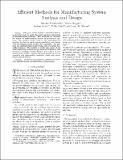| dc.contributor.author | Gershwin, Stanley B. | |
| dc.contributor.author | Maggio, Nicola | |
| dc.contributor.author | Matta, Andrea | |
| dc.contributor.author | Tolio, Tullio | |
| dc.contributor.author | Werner, Loren M. | |
| dc.date.accessioned | 2003-12-23T15:08:49Z | |
| dc.date.available | 2003-12-23T15:08:49Z | |
| dc.date.issued | 2002-01 | |
| dc.identifier.uri | http://hdl.handle.net/1721.1/4028 | |
| dc.description.abstract | The goal of the research described here is to develop tools to assist the rapid analysis and design of manufacturing systems. The methods we describe are based on mathematical models of production systems. We combine earlier work on the decomposition method for factory performance prediction and design with the hedging point method for scheduling. We propose an approach that treats design and operation in a unified manner. The models we study take many of the most important features and phenomena in factories into account, including random failures and repairs of machines, finite buffers, random demand, production lines, assembly and disassembly, imperfect yield, and token-based control policies. | en |
| dc.description.sponsorship | Singapore-MIT Alliance (SMA) | en |
| dc.format.extent | 238840 bytes | |
| dc.format.mimetype | application/pdf | |
| dc.language.iso | en_US | |
| dc.relation.ispartofseries | Innovation in Manufacturing Systems and Technology (IMST); | |
| dc.subject | manufacturing systems | en |
| dc.subject | performance analysis | en |
| dc.subject | system design | en |
| dc.subject | decomposition | en |
| dc.subject | optimization | en |
| dc.title | Efficient Methods for Manufacturing System Analysis and Design | en |
| dc.type | Article | en |
